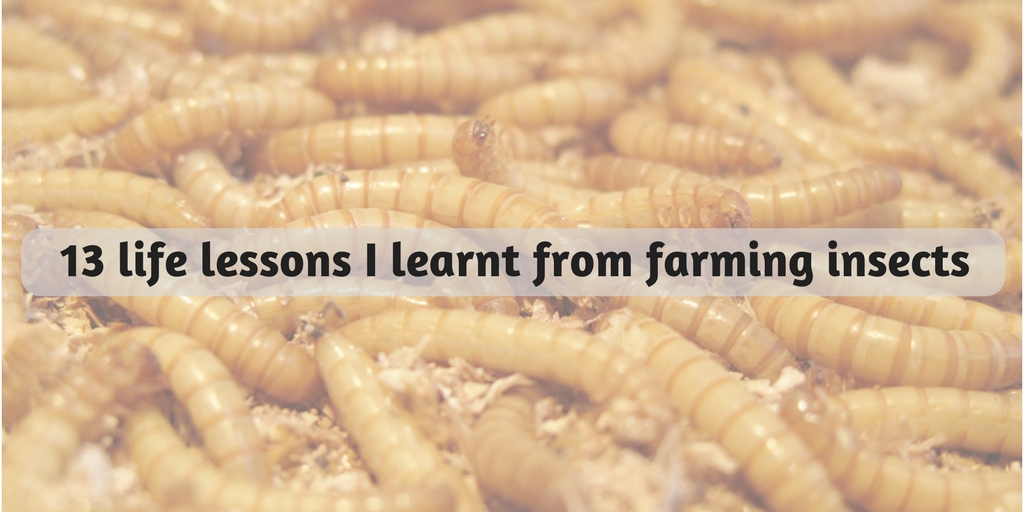13 life lessons I learnt from farming insects
I’ve been involved in the edible insects and insect farming industry for more than five years now. This journey began when I started farming insects in my dorm room, a single box of hundred mealworms. Since then, I learnt every day about edible insects, got and seized many opportunities. I’ve been lucky to meet all the movers and shakers of the industry from speaking in Detroit and Paris, attending workshops and conferences in Wageningen, Madrid and Rome without forgetting how it feels to work with your dad and amazing teams in France and China.

But, maybe the greatest life lessons I learnt came directly from the time spent farming insects. Those moments spent on my micro farm were really valuable. You inevitably grow and learn while you try to understand the most successful creatures on earth. Here are 13 life lessons I learnt from farming insects.
13 life lessons I learnt from farming insects
1. Commit
Discipline is the root of all good qualities – Jock Willink
Everything starts when you decide to commit to the mission. Once you decide that you’re going to do something, whereas it’s learning how to farm insects or anything else, you have to commit to it. Embarking on the journey of learning how to farm insects will require some commitments. Insects are the most successful creatures; there are more than 1 Millions species from which 2000 at least are edible. They started emerging from oceans about 400 Million years ago and have been evolving and adapting since these ancient times.
Of course, you can set aside a box of insects with the right food and they will survive and even thrive but if you want to improve the cycle, learn you’ll have to take care of it regularly. When it’s related to biology, time is an essential factor; you can’t just let everything aside and expects the best results.
Once you committed to starting, you can’t just initiate right now and hope for the best. Learning the basics is required.
2. Be prepared
Proper preparation prevents poor performance
You can not expect great results without learning some few basics about the insects you intend to breed. Knowing their life cycle, what they feed on and what’s their breeding condition should be the least required information.
Georges Louis Buffon once said: “A fly shouldn’t take more space in your mind than it takes in nature.” That’s maybe why I think about them all the time.
It’s like everything, you can’t be an expert in anything, but at least you know what you’re talking about and understand the basics that will help you learn faster in the long run.
3. Initiate
For the things we have to learn before we can do them, we learn by doing them. – Aristotle
There will be a point when it’s time to do. That’s the best way to learn. The sooner is the better.
You can read as much as you want, you’ll never know everything, and that’s perfectly fine. By doing and acting, you’ll learn much faster. Learning the basics had helped you avoiding some early mistakes, now it’s time to initiate and learn from your own by doing.
Just as in everything, you learn by doing.
4. Learn from the experts
If I have seen further it is by standing on the shoulders of Giants. – Isaac Newton
Learning by trials and errors is perfectly fine and is part of the learning process. Many people probably got the same problems and issues as you and figured that out. Why not reach out to them?
For insect breeding, many industrial secrets cannot be shared, but I have been lucky to meet people who shared their knowledge with me. I’m so grateful for that, life is too short you can not figure out everything alone.
5. Open your mind to new ideas
Learning from “outsiders” of the field also provide a lot of values. When you start digging deeper into a topic, you have to expand your ideas and mind to other fields. When I started learning about farming insects, I was aware that I would maybe end up studying insect physiology and insect nutrition, getting back to chemistry, mechanics and electronics were less obvious.
6. Connect the dots
You can’t connect the dots looking forward, you can only connect them looking backwards – Steve Jobs
Sometimes what you’ll read, learn, hear and observe won’t seem important to others and unrelated to what you’re looking for. But, when you gain expertise, you realise that everything is related, and breakthroughs often come from combinations of those ideas.
7. Adapt
Those who cannot change their minds cannot change anything. – George Bernard Shaw
Because something worked in the past, it doesn’t mean it will work forever. That’s especially true for insect breeding. Something unexpected can happen and what can you do about it? Just as the insects you’re studying: adapt and evolve.
8. Take some notes
What is measured, can be managed. – Peter Drucker
Every time you see something, make some tests, write it down. A weak pencil is stronger than the sharper memory. Measure and note everything, how can you know why something work or not if you didn’t note the parameters?
When I was in Shenzhen with Livin farms, I learnt a lot from the discipline applied by Katharina Unger and Julia Kaisinger during the tests we made. Everything was noted and recorded on video.
Sometimes, I didn’t write tiny details because they were not important at that time, only to realise that they mattered…
9. It’s all about the details
Everything in life lies between those two paradigms: “99% of things in life doesn’t matter” and “Life is all about the details” It will depend on what details matter to you.
For insect farming just as for everything, it’s when you get experience and set clear goals that you get a better sense for the details that matter and can detect earlier something odd. And what you do when something unusual happens? You write it down, learn, adapt and take action QUICKLY.
10. Patience and reactivity
Macro patience, micro speed – Gary Vaynerchuk
Insect farming is interesting and has potentials for several reasons. Some of the particularity of insects is that they grow fast and can reproduce quickly. When you farm insects, you can’t take care of individuals, you take care of a colony. While insects grow fast, having a healthy and sustained colony takes some time, you have to be patient. At the same time, you observe individuals, and when you notice “details” at the micro level, you have to take action before it spread and affect the macro-level, your entire colony.
11. Resilience
Passing one obstacle simply means you are worthy of more. The world seems to keep throwing them at you once it knows you can take it. – Ryan Holiday
Once the insect colony grows and time passes by, some new issues will arise. With the skills and experiences you develop, you can adapt and find new solutions. Problems that you though unsolvabe can be managed easily than you ever thought.
12. You’ll never have all figured out.
Insect farming is such an innovative topic that unexpected problems will arise. Insects are complex creatures, there are so many species, that all their behaviours are not and will probably never be totally understood. That’s when you think that you can deal with every situation and every problem, that something will happen.
13. Acceptance
What can you do about that? Accept. The Stoics have figured out that in life, there are things you can control and things you can not control. If things you can’t control are going bad, you did your best to manage the situation and it still doesn’t work out, the only thing you can do is to accept it. In fact, when dealing with insects the only thing you can totally control is your reaction to the inevitable unexpected events.
I decided to write this post after hearing from my personal experience as micro insect farmer and the interview of ex-Coalo Valley cricket farmer in the Ento-Nation podcast, my new favourite show with the Cricket- man.
If you want to learn about farming insects, eating insects or everything related to edible insects, you should definitely subscribe to it!




__
I live in the US and out of necessity, just started raising mealworms for food.. I’ve been watching every video and reading everything I can get my hands on and taking notes along the way.
Every single day I see more and more people living on the streets (they need to eat too) and look forward to being a part of the solution; I understand the need to make money, but I am grateful to all the folks who don’t keep the tricks of bug raising a secret, I am not wealthy but any stretch of the word, but raising bugs gives me hope that I can help feed people who are hungry.
Thank you for sharing your insight,